Being Safe to Be Me starts with self-compassion
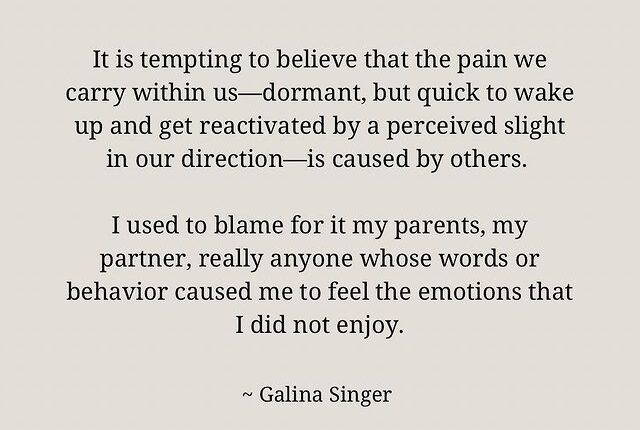
Most of the people whom I have confronted about the pain I felt they’ve caused me, were either in denial of the event or its impact (my parents) or perceived it as something completely different (my partner, friends).
I learned that in most cases what caused me the pain was my own interpretation of events and what I had it mean about my value or lovability.
Whatever “harm” spilt out on me from people in my life had not much to do with me, but their own inner pain and trauma.
Their behavior had nothing to do with my “deserving” it, nor was it a reflection of my worthiness or my “goodness.”
I understood that my parents were completely unconscious about the harm they were causing, trying—as most parents do—to show up the best they could.
Like most parents – they loved their children but were stuck in the prison of their own conditioned take on life, blindly reenacting the patterns and coping strategies from their own childhood.
It is when I saw how I had perpetuated my family’s dysfunction – unconsciously, against my intentions – in the way I parented my own children that had shaken me enough to step into my power to initiate change.
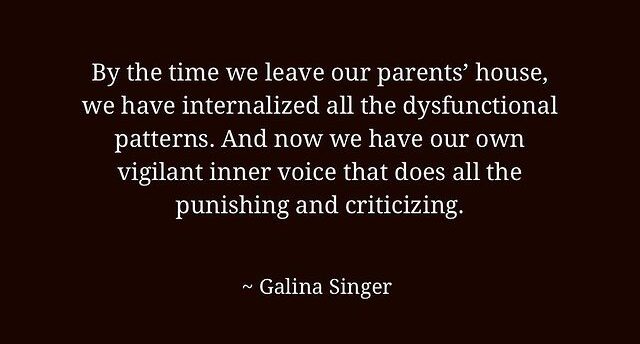
It is these internalized critical voices that are invisible to us that guide our choices in life.
The inner critic fueled by the unconscious limiting beliefs about our value and lovability keeps us in fear of change and block us from embracing opportunities for growth and creative self-expression.
In relationships, this inner voice has us begging for scraps of attention and shapeshift in order to be chosen.
Basically, we continue using the same coping mechanisms that helped us survive in childhood, except they do not serve us in adulthood.
The fact that we continue navigating life from the point of view of dependent and helpless children in need of protection and saving, explains all the relating problems we have when we try to form our own families, and arguably many of our health issues as well.
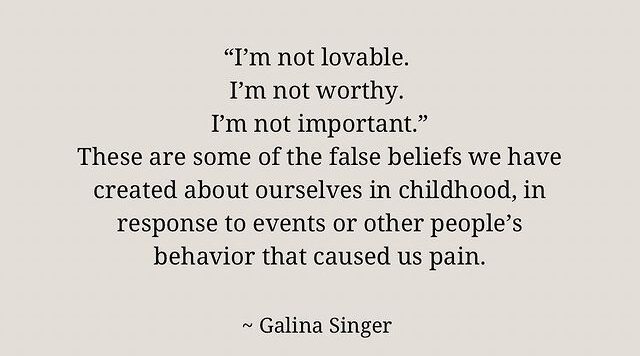
This sense of unworthiness has us make choices and decisions that create destructive patterns that confirm and perpetuate our sense of unworthiness.
When we are set in this pattern of self-rejection and have lived our whole life in this way, we love rejection rather than love.
That rejection of self leads us to reject any pleasure. Our rejection of happiness, joy, pleasure, life, and love is in reality just a rejection of self.
It is quite difficult to overcome these beliefs, so ingrained they are in our self-concept. Until we come to understand that our parents’ real or imagined rejection of us had nothing to do with our worthiness.
The facts of our stories remain, but we no longer interpret them in the same personal, self-diminishing way.
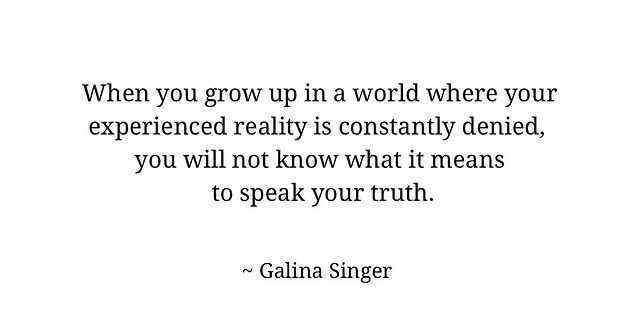
What is mine and what is not mine?
How to know who I am? What do I want? What makes me happy?
These questions come up often in my sessions.
Raised in codependency we’ve focused on other people’s feelings to such an extent that we no longer know what ours feel like.
Trying to fit into other people’s expectations of who we should be, we’ve lost connection to who we already are.
Denying ourselves rest, food, pleasure and fearing connection with others – we do not remember what happiness feels like.
That is why we continue chasing it through ready-made one-size-fits-all formulas to the successful life we were given, like achievement, marriage, consumerism, titles, and various other status symbols.
We do not know where we end and others begin.
The inner split, the disconnect from our emotional experience has brought us to complete reliance on outside messages as guidance.
What is right?
What is wrong?
What is good or bad?
My question is always the same: good for whom?
We have come to a place where relying on outside guidance of what is right or wrong does not serve us very well.
It is time to develop our own internal guidance so we can each make decisions about what is right for us. What happiness means to each one of us. And then feel Safe to Be Me enough to pursue it.
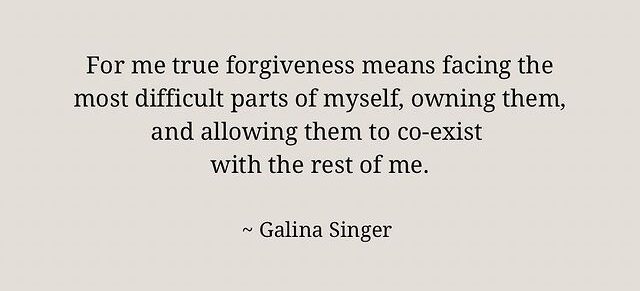
That is true safety. It is also true freedom.
Owning all that I am means I no longer have to hide any part of me.
I no longer need masks because I am not afraid to be seen.
I no longer expend a lot of energy trying to be someone I’m not, and instead use my energy for more creative pursuits like building my dreams into reality.
I no longer become destabilized by other people’s perceptions of me, nor am I at the whim of their opinions, because I own all that I am and I know what I am not.
When I incorporate all parts of me it allows me to operate more from my center.
When I venture into my shadowy parts and bring them to light they no longer have the power to blindside me or people in a relationship with me.
My repressed parts no longer have the power to explode out of me when I’m not vigilant.
The more of me becomes visible to my conscious awareness, the more I have a choice of how I want to show up.
Being Safe to Be Me starts with self-compassion. Forgiveness and freedom follow.
Deconstructing Pain from Breakup and Self-Sourcing Love
Our pain stems more from the story we tell about what happened than the actual sensations we feel.
And these stories that we attach to – they are formed from beliefs we’ve inherited and rules we are told we should follow. These are scripted narratives, often not checked with our own inner wishes or values.
If we free ourselves from prescriptions of how relationships should unfold, then we can view people who come in and out of our lives as message deliverers. We have the potential to learn from each other and/ or about ourselves and that in itself is enough.
We are here to grow, to evolve, to expand our conscious awareness. And our relationships help us on our journey.
So the pain we feel often stems from the discrepancy between what we were conditioned to expect and the actual reality of the situation.
Ultimately the pain we feel is not someone else breaking our heart, but our own shutting of our heart in response to the story we impose on the events that are happening.
What hurts is the constriction, the blocking of our own love supply.
And of course, if we can shut it down, we can also learn to keep it open no matter what happens on the outside.
This is self-sourcing love.
This is freedom.